
Film Daily gives a big welcome to Tiffany Kontoyiannias and ‘Welcome Back’
Tiffany Kontoyiannias is a Latina filmmaker who recently wrote and directed short film Welcome Back.
Tiffany is a Columbia University Graduate who graduated from University of Southern California’s School of Cinematic Arts. She is a published playwright and has been recognized for her work in film. Tiffany is also known for her anti-bullying work and organization.
After moving to Miami as a child, Tiffany was severely bullied by her classmates. This inspired her to write The Cycle, a play that demonstrates the effects of bullying. At the age of 14 she was touring South Florida with her cast to showcase her play.
Since then, she has appeared on MSNBC, NBC, TV Venezuela and CBS to speak about bullying and how the visual arts can be used to create change. Keeping this passion in mind, Tiffany began creating films that brought inspiring, engaging and important topics to light.

Her most recent projects Maid in America (2016), Borderlines (2017), Non-Disclosure (2018) and Welcome Back (2019) have been devoted to exploring important topics and Latin stories in hopes of further diversifying the industry.
Welcome Back is centered around Rosa and her daughter. After being deported back to dangerous and communist Venezuela, Rosa and her daughter must find a way to escape to a nearby town in Colombia.
Make sure to check out the updates on Tiffany’s film Welcome Back on Instagram, and the trailer. Here’s our interview with filmmaker Tiffany Kontoyiannias.
Tell us about your history as a filmmaker. How did you start your journey?
My journey in filmmaking really began when I was 14 years old. I had been severely bullied by two “friends,” and almost had to leave my school.
This happened at a time when bullying was brushed under the rug, so their solution was to punish everyone, even though I had proof of being bullied online and at school. Knowing how much my parents sacrificed to afford this school, I found the courage to stick it out, focus on my studies, and stay at my school.
A year later I was watching a news report about a girl who had been bullied in a very similar manner, and ended up committing suicide. I remembered feeling the rage and hurt I felt those years before, and did the only thing I knew to do—I wrote.
My pain fueled my creative energy and led me to write a few monologues about my experiences with bullying. I was a theatre nerd, and for some reason the stage seemed like the perfect place to express my emotions.
The next day I brought it to the counselor at my school and persuaded her to let me present it. After each performance, parents, teachers, and students were finally discussing a topic that desperately needed attention.
As time went on, I had written enough material to turn it into a play. I was able to tour my community and present the piece. My play went on to win several awards and went on to be published by Dramatic Publishing. I also started an organization that helped schools implement anti-bullying policies that could bring some change.
I spent a few years thinking I wanted to create change by becoming a lawyer, but quickly realized that film is such a powerful platform to not only entertain, but to spark change. So here I am, years later, with the same mission: to create and tell stories that are socially conscious, and can serve as vehicles for change.

Who are your current influences?
Ryan Coogler is one of my favorite directors. He also graduated from USC, in the same program as me, and I have seen every one of his films (including most of his student shorts). He’s not only an artistic genius, but he always finds a way to convey a message without making you feel like you’re being force fed a “message.”
Fruitvale Station, is still to this day, my favorite film. His films pose questions, not answers. He has been able to bring so much positive change to the industry and has literally made history with films like Black Panther.
What five TV shows do you think everyone should watch this year?
Jane The Virgin
Ozark
Dead to Me
Big Little Lies
Living With Yourself
Cat or dog?
Dog
What was the one movie you saw that made you want to go into film?
12 Years a Slave. I remember feeling so physically sick to my stomach when I watched it, that I almost left. It was so hard to watch, but it was so honest. It was an experience. I cried more in that film than I ever have before in a movie.
When the film ended, I immediately began researching things that I had once glossed over in history textbooks in school. The film stuck with me for weeks, and I remember thinking, “These are the types of films I want to make. These are the types of stories I want to tell.”

How was working on Welcome Back? What did you learn from the experience?
Challenging, but beautiful.
Shooting in a foreign country brings a whole set of other challenges you aren’t used to as a filmmaker. I was completely out of my comfort zone. I remember thinking it would be a lot easier for me since I am half-Venezuelan, and this is my culture. Although I speak the language, and understand the culture, I still had a lot to learn when it came to adapting to the way they work, and the way they do things over there.
We lost an Ecuadorian producer, couldn’t find our lead until 3 weeks before production, and even lost a location one of the days—the worst moment of them all. But as production teaches you, there is always a solution. We ended up finding another incredible producer, found an amazing lead, and found an even better location by knocking on doors that very same day.
It taught me to not harp on the problem, focus on the solution, and trust that the answer will come.
Tell us about your career before you found film.
I was a pre-law student for some time, and was studying psychology as my major, with hopes of getting into law school. It didn’t take me long to realize that law school wasn’t for me…for now. Maybe in the future.
Where did the concept come from for Welcome Back?
For years I wanted to tell the story of Venezuela. Although I was not born in Venezuela, the culture runs in my veins. My mother is Venezuelan and she gave me a very Venezuelan upbringing. She would take me to Venezuela to visit our family 2-3 times a year, and as a result it became my second home. Venezuela’s culture still plays a huge role in who I am today, and I cannot describe the sense of belonging I feel around other Venezuelans.
Having lived in the US with immigrant parents, I often think about how my destiny has been impacted by immigration. Seeing my family struggle to stay in their own land, which they had no desire to leave, has been hard to watch.
They want to stay there, they love their home, but if things don’t get better, they may not have any other option but to leave. Many close friends and family members had to flee, and I’ve witnessed the difficulties they had to face.
Having my family there has been very hard for me, and I felt very helpless with the situation going on there. So I ultimately decided I needed to do something, and I would do it through the medium I knew best—film. The idea was ultimately inspired by my relationship with my mother, and how she, along with my father, always made sacrifices for me.
The story itself, especially in regards to the parts about deportation, was my way of making this story global. We all have a responsibility when it comes to countries like Venezuela, and having compassion for others who are forced to flee their home is a huge first step. That intention was the driving force behind “Welcome Back”.

What music inspires you to create?
Interestingly enough, country music. It’s a genre that uses music to tell stories through their lyrics. I feel like every time I listen to it, I get to watch a little movie in my head. However, if I need to sit down and write, I normally go to some classical piano music so I don’t get distracted with any lyrics.
Talk us through your creative process.
My creative process is very “interesting” to say the least. I’ve noticed that most creative write something over the span of several weeks or months (sometimes years), which I like. However, every single film I’ve ever written and directed has not happened that way.
I start with themes, and a tone I want to approach, and then spend weeks and months in what I call an existential crisis trying to figure out what to write. And then out of nowhere, when I’ve essentially lost all hope, I get the idea in a flash and I can see the film from beginning to end. I end up writing my film in hours, and it normally is pretty close to what I shoot.
That’s how Welcome Back happened. I wrote 3 other stories, with similar themes, and story beats, but they all were horrible. Then suddenly, the exact idea came to me at 3 am, mid sleep. I opened my eyes, and weirdly enough saw the film I wanted to make.
It has so far worked out, but it is an excruciating process. I’m trying to get better at that.
What tips do you have for new filmmakers?
Don’t underestimate the importance of collaboration. Quinten Tartino once said that what makes him such a good director is that he hires the right people. I couldn’t agree more. Filmmaking is a collaboration, and you are only as good as the team you choose to surround yourself with.
Network, and never stop searching for the perfect people for your tribe. Being on set is a battle zone, and you need to assemble the right army to win that fight.
What part of filmmaking do you geek out about the most?
I never get over when you’re about to go in for your first shot of the movie. Seeing the actors in costume, reading the lines you wrote, in an environment you once imagined is surreal. It’s literally seeing a dream come to life.
You’re very hands-on with your projects. How hard is it wearing all the hats?
It’s definitely tough. I wrote, directed, and co-produced this film. There were times on set I had to wear my producer hat, and it would distract me from my creative work. However, it’s part of the job, and I wouldn’t have it any other way. I also had a lot of help. I had amazing producers, and had the best cast and crew in the world.
If you could only watch one movie for the rest of your life, what would it be?
Fruitvale Station or La La Land. I can’t decide!
What’s your next project?
I am currently writing a feature, and also working on a few TV pilots, and treatments! I’m very excited to see where they will go.
Have you worked with mentors in the past? How would you recommend people go about finding them?
Yes! I’ve been fortunate enough to have wonderful mentors, some of which are incredible producers, writers, agents, and directors! That was the main reason I wanted to go to get my Masters at USC. I didn’t come from a family in show business, so had to start from scratch with my network. Most of my mentors have been attained through internships, work, and school!
What has been your biggest failure?
There’s this quote that says, “Failure doesn’t exist unless you allow it to.” Yes, I’ve definitely had moments where I felt like I had failed, but because I grew from it, I look at it as a win. Other than that, I think I’ve only really failed in moments where I didn’t try my best.
What’s your filmmaking mission? Name the most important thing you want viewers to experience when watching your movies.
My mission is to create and tell stories that are socially conscious, and can serve as vehicles for change.
I want my viewers ultimately remember that we are all human. We all feel, we all have fears, and we are all mortal beings. We live in a world right now where there is an excess amount of hate. I personally believe that hate is a symptom of fear, and the only cure to fear is understanding. That is why I think film is so powerful. It is arguably one of the most powerful ways to allow an audience to spend a certain period of time in someone else’s shoes.
All in all, I hope my movies can help people understand, and can help others feel understood.
What has been your biggest success?
I think my Anti-Bullying work has been one of my most successful projects. I was able to tour, go on a variety of news channels to speak about the work, and was able to meet so many wonderful people!
The best part about it is that I was able to see a lot of the change that the play, and organization sparked. Young kids would come up to me after the performances sharing their stories, while others told me they were going to apologize to the kids that they bullied. This was the beginning of my love for this kind of work.
Can we expect to see any episodic television from you anytime soon?
Yes! I’m developing a few very exciting projects. I truly can’t wait to see them come to life, hopefully soon.
What’s your five-year plan?
Oh no! I’m putting this out there, so now I need to stick to this!
I would say my hope is to have already directed the feature film I am currently working on, and to continue writing, and selling scripts for films and television. I love producing as well, so I hope to be doing that no matter what.
Point is, if I’m still telling stories, and making movies or TV that I’m passionate about, I’ll be happy.
What indie filmmakers should be on our radar?
My partner, Roy Arwas. Shameless plug, but he really is the most talented filmmaker I know.
What’s your favorite film of all time, and what did you learn from it?
I have two favorite films that are coming to mind. Fruitvale Station, which taught me that there is a lot of beauty in simplicity. Protagonists can be flawed, as long as their wants/needs are universal.
I also love La La Land. Although I know some people weren’t a fan, the film truly impacted me. It taught me that you can revisit old genres, and make them your own. The only rule in film, is that there aren’t any rules. The film explored things we thought we had seen, and yet it felt like nothing we had seen before.
Who would compose the soundtrack of your life?
Jesper Ankarfeldt, the composer to my film. He’s the most talented composer I’ve ever met, and I would be honored to have a future Oscar winning composer write my life’s soundtrack.







